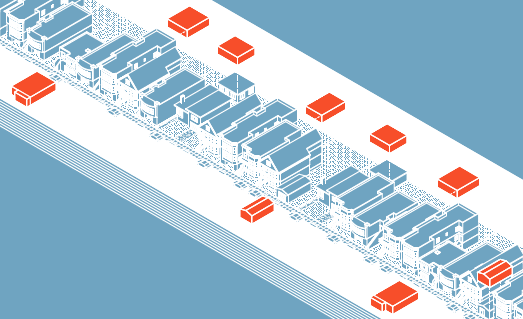The Value of Space?

When I retire, I plan to sell my home [with you, we might add and certainly hope] and move away from the Bay Area. In the meantime we’re thinking about constructing a studio apartment on the ground floor. Currently the ground floor is used for one-car parking and storage. The studio apartment would be ~ 325 square feet, have a private entrance from the street, and be located at the back of the building with a private deck connected to the backyard. The front part of the ground floor would still be used for one-car parking and storage for the condo homes in the building. The idea is to rent out the unit on a home-sharing platform you may have heard of and, during the 275 of the days of the year that it can’t be rented out, it would be available and used by all units in the building for visiting friends and family. We plan to do this with all the necessary permits, including revising the CC&R’s to formalize how the owners would share usage of the unit.
My question: If we were to do this, are you able to provide a rough estimate as to how much this would enhance the value of the building?
We certainly hope so! First the theoretical, and then the evidence we could find in three properties: A, B, and C.
Matt and I are both thinking that the highest value would come from it as a separate entity that could be sold at some point in the future. This would, of course, remove a neighbor’s ability to use the shared space after one of you sells, but if they would consider it, perhaps it’s worth exploring.
Matt’s suggestion is to have you and your HOA partners build it as a legal, separate, third accessory dwelling unit (ADU) if that’s possible, and share it as you have proposed. Along with this, you could agree that when the first party that helped build the unit sells their primary condo, the new third space would be sold, too, and proceeds could be split in a pre-determined ratio or formula.
If you and your neighbor add the space as an HOA amenity, I do think there’s value to it, but it’s hard to put a dollar figure on it. So much depends on a buyer seeing value in it, and having it half the year would be useful to some people and not to others. If someone is looking for space for a home office, for example, they’d probably not be too excited about having access to it for less than half the year. It’s really ideal for visitors but not for a permanent use, so I could see it being very valuable to people who have extended visits from family or maybe if someone wanted to have a “roommate” for a semester.
Long story short: there’s value in any living space in SF, and to get the highest value out of it, building it as a third unit that can convey separately would likely bring the best return on your investment.
And what about those three properties that aren’t just theoretical? I searched the MLS to get real-life information about sales of condos with shared guest quarters, and I found three sales.
I’ll cut right to the chase: I can’t find evidence that investing $150,000 – $2000,000 each would add the same amount of value to the primary residence in the building. For the three properties I could research, they had sale prices within the same range of sale prices for similar properties. (I searched for similarly sized condos that sold three months before and three months after the sale of properties A, B, and C.)
I talked to the agents for each one and I’ll summarize their comments. I asked each one if he/she thought the extra space added value.
- Property A: No. At this property, buyers were confused by the space and many weren’t comfortable with the concept of sharing space (and maintenance and furniture…) with a brand-new neighbor and HOA partner they don’t know. Without prompting, this agent made the same recommendation that Matt and I did about building the studio as a legal third unit.
- Property B: Also no. This agent also offered the same opinion about building it as a legal 3rd unit. Buyer feedback about sharing the space and not having full-time use of it was not positive, shall we say?
- Property C: This agent said things about his shared space we aren’t printing here. He didn’t market it in the MLS and it was a pleasant surprise to buyers when they showed up to see the place. He said it didn’t add any value, which is why he didn’t market it.
